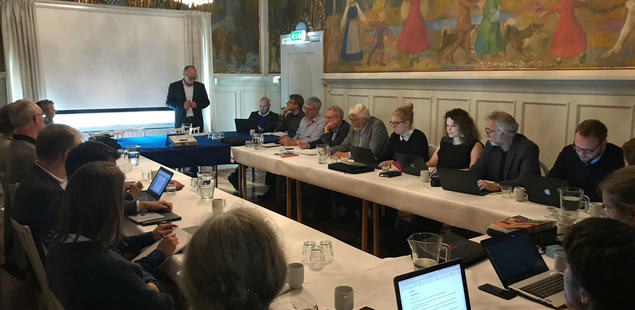FNI in Sharm El-Sheikh for COP 14: Shifting the tide for biodiversity

The Fridtjof Nansens Institute (FNI) will play an active role in the 14th Meeting of the Conference of the Parties to the Convention on Biological Diversity, which takes place in Egypt during November 2018.
 Kicking off on 17 November, the COP 14 delegates will start negotiations on a new global plan for biodiversity - a plan meant to be finalized and agreed on in China in 2020, but which seems more imminent than ever, with biodiversity loss still continuing at an extreme pace.
Kicking off on 17 November, the COP 14 delegates will start negotiations on a new global plan for biodiversity - a plan meant to be finalized and agreed on in China in 2020, but which seems more imminent than ever, with biodiversity loss still continuing at an extreme pace.
More actors at the table
FNI will take an active part in shaping the outcome of the COP 14 in Sharm El-Sheikh, Egypt: Besides co-authoring a policy brief on lessons to be learned from the climate change regime, FNI will co-host a full day event under the heading Rethinking biodiversity governance for transformative change. Here, researchers and policy experts will focus on what they see as a shift in biodiversity governance, from having been first and foremost a governmental issue to increasingly becoming a more polycentric field with both state and non-state actors engaged in biodiversity issues. This shift of course raises questions about the design of international agreements, and it also has implications for what a post-2020 global biodiversity framework should look like.
Finding new solutions
FNI will also co-host or give presentations at other events: On 25 November, FNI will co-host the side-event 'Rethinking Biodiversity Governance: ingredients for the post-2020 global plan for biodiversity', together with PBL, IDDRI and SCELG. Here, the key issue will be finding alternative options and improved solutions for the new biodiversity framework. This event builds on work done by the Rethinking Biodiversity Network, which was first launched at FNI in 2017.
Increasing ambitions and new targets make little sense without improving the governance systems that have failed to meet the global biodiversity targets that the world has set for itself for 2010 and 2020", says FNI Senior Policy Analyst Christian Prip.
Among the issues on the table will be whether one should simply adjust and improve the current system, or whether one should turn to a different type of architecture, be it a pledge and review system inspired by the climate change regime or a more human rights-based approach.

Learning from Paris
FNI will also take part in two other side-events during the biodiversity summit in Sharm El-Sheikh:
The side-event 'Biodiversity governance in the post-2020 framework – lessons to be learned from the Paris Agreement on climate change?' on 26 November is hosted by FNI together with IDDRI and PBL.
The side-event 'NDCS – A FORCE FOR NATURE? Presentation of research how biodiversity is reflected in the Nationally Determined Contributions (NDCs) to the Paris Agreement of 100 countries' on 25 November is hosted by WWF. FNI analyst Christian Prip will be part of an expert panel discussion.
The Paris Agreement system with national determined contributions could be an inspiration for the new global plan for biodiversity both as governance architecture and as a tool to better integrate actions for climate and biodiversity, says Prip.
